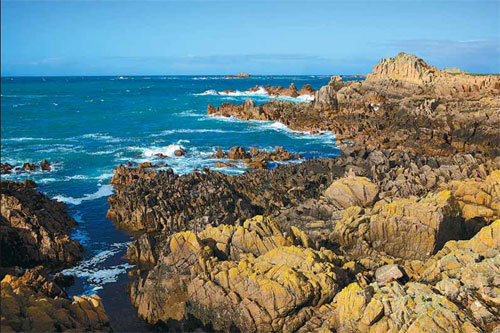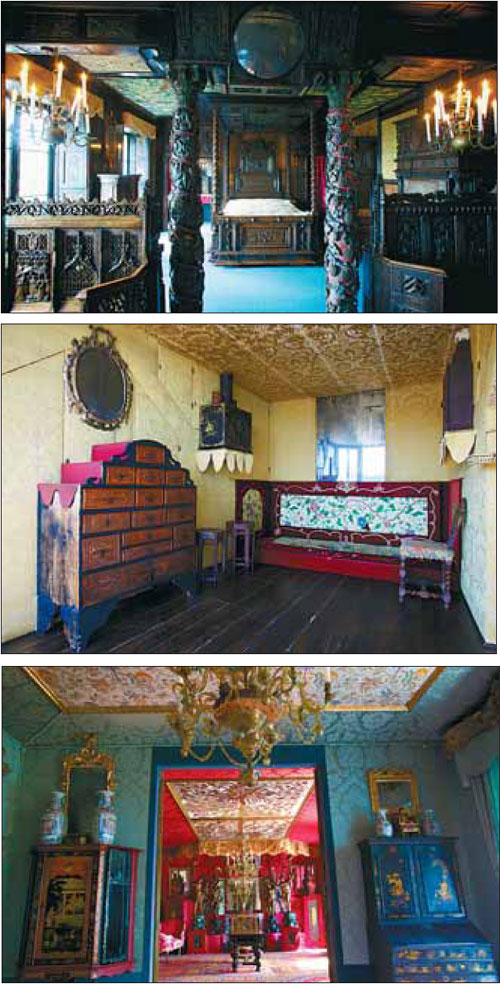Where Victor Hugo found freedom
Updated: 2012-08-13 16:00
By Ann Mah (The New York Times) (China Daily)
|
|||||||||||

 |
|
Victor Hugo spent six years decorating his house. Provided to China Daily |
Guernsey is best known for being an overseas tax shelter. But the Guernsey of Victor Hugo - a place of quiet contemplation, vigorous cliff walks and seductive swimming bays - is still palpably present, as are elements of the writer's life on the isle. Ann Mah explores.
In October 1855, Victor Hugo arrived on rainy, wind-swept Guernsey to seek refuge.
A fierce opponent of the Second Empire of Napoleon III, he had been banished first from his native France, and then Belgium and the island of Jersey.
By the time he landed on this small neighboring island in the English Channel, the exiled writer was in desperate need of asylum.
He found it on Guernsey.
The "rock of hospitality and freedom", as Hugo proclaimed it in his seafaring novel Toilers of the Sea set on the island, would become his home for over 15 years.
Undistracted and determined, he poured his creative energy into masterpieces like his epic novel Les Miserables and the decoration of his home, Hauteville House, the only home he ever owned.
"Exile has not only detached me from France, it has almost detached me from the Earth," he wrote in a letter.
In this wild, isolated retreat, a British dependency just 26 miles from the Normandy coast of France, Hugo passed the most productive period of his life.
From the minute his boat docked at St. Peter Port, the capital of the 24-square-mile island, Hugo marveled at the beauty. "Even in the rain and mist, the arrival at Guernsey is splendid," he wrote in a letter to his wife.
Today, travelers who arrive by ferry, from either England, Jersey or France, share this same first glimpse of the port, with its gently bobbing fishing boats and orderly rows of houses stacked along hills.
Hugo settled in one of these residences at the top of town, a rambling villa called Hauteville House, surrounded by family and a band of fellow exiles. He installed Juliette Drouet, his mistress of decades, in a modest home down the street.
Already a celebrated writer at the time of his exile, Hugo was drawn to the Channel Islands because of their proximity to France and independent governance. (Though the islands have been linked to Britain for almost 1,000 years, a 1204 charter still guarantees their autonomy.)
For Hugo, who spoke no English - "When England wants to chat with me, let her learn my language," he said with typical grandiosity - the French and Guernsey patois spoken by the island's Norman descendants were essential to his comfort.
Related Stories
Authentic Cantonese roasts travel north 2012-07-30 13:08
Travel back in time at Tang poet cottage 2012-07-17 13:30
Chinese travelers seek experience, not treadmill tourism 2012-07-17 08:57
Travel in Hubei 2012-07-10 09:22
Travels to share 2012-05-28 17:09
Today's Top News
President Xi confident in recovery from quake
H7N9 update: 104 cases, 21 deaths
Telecom workers restore links
Coal mine blast kills 18 in Jilin
Intl scholarship puts China on the map
More bird flu patients discharged
Gold loses sheen, but still a safe bet
US 'turns blind eye to human rights'
Hot Topics
Lunar probe , China growth forecasts, Emission rules get tougher, China seen through 'colored lens', International board,
Editor's Picks

|

|

|

|

|

|





